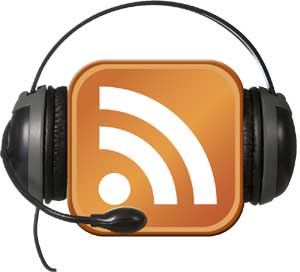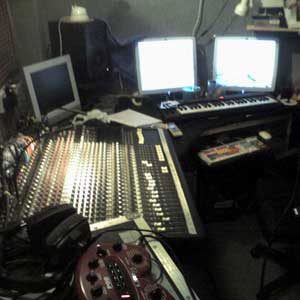 People often ask me how much time I spend working on doublebassblog.org, Contrabass Conversations, Arts Addict, and my other online endeavors. While I certainly put in a significant amount of time on all these projects, they have grown organically over time and have interwoven so tightly into my other daily activities (playing and teaching the bass, plus some web design and management) that it can be difficult to separate one activity from another. Teaching blends into the podcast, which blends into my performing life, which in turn influences my blogging. In the end, though my various daily activities may seem quite disparate to the outside observer, I feel that they all contain the same objectives and are simply different manifestations of the same creative impulses I’ve been pursuing my whole life.
People often ask me how much time I spend working on doublebassblog.org, Contrabass Conversations, Arts Addict, and my other online endeavors. While I certainly put in a significant amount of time on all these projects, they have grown organically over time and have interwoven so tightly into my other daily activities (playing and teaching the bass, plus some web design and management) that it can be difficult to separate one activity from another. Teaching blends into the podcast, which blends into my performing life, which in turn influences my blogging. In the end, though my various daily activities may seem quite disparate to the outside observer, I feel that they all contain the same objectives and are simply different manifestations of the same creative impulses I’ve been pursuing my whole life.
The short answer is this: I generally spend 20-30 hours per week on these various projects, although that number can go as low as zero hours (when I’m on vacation) or as high as 70-80 hours. Honestly, the most time I ever spent on my online projects was probably in 2005 as I began building what would later become the doublebassblog.org practice track archive. Building a blog is something that I’ve done a little every day for a few years. Blogging is a cumulative project, and these modest outlays of time and effort eventually pay big dividends. Looking back in the Contrabass Conversations archive now has an almost dizzying effect–I cannot believe that I’ve done all these interviews, that so many musicians have contributed their thoughts and playing to this project. Yet even that formidable archive was built like the blog–a little at a time.
Honestly, the content creation process is the part of the equation that usually takes the least amount of time (and is the most fun!). Editing audio and video, plus the hundreds of behind-the-scenes tasks required to manage a large community site is what takes the most time, and it is what is least noticeable to readers and listeners (though they would certainly notice if these tasks weren’t done!).
This is why, when folks ask me how they should go about starting a blog, I usually tell them to get an account at WordPress.com or Blogger.com. Though folks may eventually outgrow these free hosted options, they are the easiest to get up and running (especially Blogger). And, if anyone asks me about how to get into podcasting, I tell them to give me a call or find someone to help them out. Blogging is a little more forgiving of early missteps than is podcasting, and if you don’t set up your podcast solidly (with its own site and URL, correctly encoded with the right meta tags and podcast directory information), you may be in for some heartache down the road.

I took quite a bit of time to plan my podcast, starting to experiment with it as early as June 2006. I had picked out the name Contrabass Conversations and actually set up a site for it at www.contrabassconversations.blogspot.com, though thankfully I waited until I had all my technical ducks in a row before beginning in earnest. I took my time, figuring out what equipment I needed (microphones, mixing boards, sound cards, software, set-up for recording phone calls, multiple participant recording solutions), how I could best host the files to set myself up for the long term (I ended up using libsyn.com, which is an awesome company), how frequently I should put out a show, how long they should be, what kind of show structure to use, how to set up a call-in number, etc.
See how many factors go into setting up a podcast? And that’s only the start! Then you have to find guests, track down music (making sure that it is legal for podcasting purposes), and promote, promote, promote. It is loads of fun, but it is a huge amount of work and can be completely exhausting and overwhelming–much more work than blogging!
It also happens to be, for me, my most meaningful contribution to the bass community–the exact sort of thing that I wanted to do when I started dabbling online. Now, I love doublebassblog.org, and that’s not going anywhere, but I sincerely believe that the podcast is what will have lasting impact.
All the above-mentioned practical technological and considerations are things that I was aware of and planned for with Contrabass Conversations. Having been a fan of the podcasting space since it emerged, I knew what I was getting into (something that overwhelms and sinks many podcasters), and I am comfortable wearing all these hats, but I’m the first to admit that doing this kind of thing is not for everybody. If you’re interested in doing a podcast but are unsure about handling all of this minutiae, get some help! There are many people out there willing to assist. Just drop me a line (jasonheath@doublebassblog.org) and I’ll be happy to steer you down the right path.

One realizes over time that being a blogger means wearing many different hats, and that being a podcaster adds even more! I currently perform the following jobs for doublebassblog.org, Contrabass Conversations, and other sites that I manage (all of these jobs could easily be held by multiple members in a larger organization):
- Writer
- Reporter
- Editor
- Advertising Department
- Photographer
- Graphic Designer
- Audio Editor
- Sound Engineer
- Video Editor
- Community Manager
- Web Designer
- Server Manager
- PR Department
How much training have I had for these jobs? None! Yet the D.I.Y. culture of blogging and podcasting (the same sort of outlook that I admire in the punk rock movement of the 1970s and 80s) encourages one to dabble in all of these crafts, and while one may not be extremely proficient in all of them, having a basic understanding of the aforementioned jobs helps greatly in running a blog.
_____________
Over time, I definitely anticipate creative types outsourcing much of the technical framework to others, allowing them to create without worrying about how to publish it on the web, format it to work with a portable media device, or effectively utilize the promotional resources of the web. I have started to provide some of these services for a few individuals, and I only see this becoming more popular as time goes by.
I recall listening to an interview recently with Arianna Huffington in Blogger and Podcaster Magazine and marveling at how effective her arrangement is with her collaborators on the Huffington Post. She provides the technical framework for her contributors–all they need to do is submit their writing. Her team handles the rest.
Really, this is as it should be. Why should anyone wanting to produce content have to learn the dozen or more skills I mentioned earlier just to get their message, service, or product out there? I see an emerging market for people wiling to handle this technical framework. Think how many more people would create a podcast if they could just record their voice and submit it to someone for editing, adding music, uploading, and distributing!
______________
To me, publishing a podcast, editing my blog interface, or moving files from one server to another is a breeze, but I spend every day doing these tasks, so my perspective is quite different from someone whose daily technological experience consists of checking e-mail and surfing the web. Apple has made this kind of process much simpler with Garageband, iMovie, and their other wonderful applications, but there is still a considerable learning curve for novices.
Bass News Right To Your Inbox!
Subscribe to get our weekly newsletter covering the double bass world.
